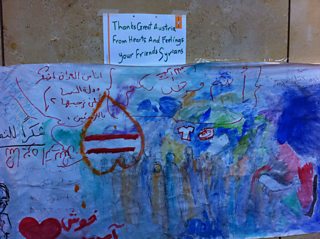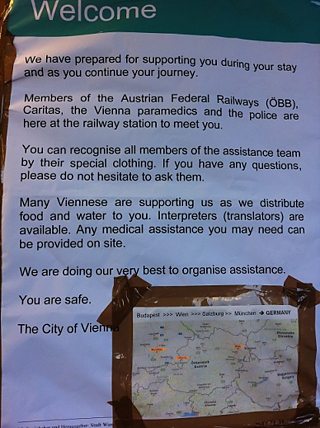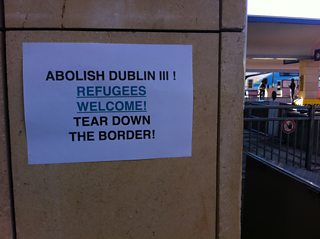We are pleased to host this guest post from Dr Frederick Baker, who is a director of British and Austrian parentage now based in Vienna and Cambridge. He is also an academic and an expert on the politics and culture of Europe. He has made a number of Arenas, including 'Stalin: Red God' (2001), a film about the nostalgia and persistence of support for Stalin in the former USSR, 'Imagine IMAGINE' (2003), an account of the enduring appeal of the John Lennon classic, and 'Shadowing the Third Man', which tells the story not only of how the film was made, but the history that informed it. That film was Baker's principal submission to Cambridge University for his PhD. He also made 'Eric Hobsbawm on the Pressburger Bahn' (1996), in which Hobsbawm looked at the turbulent history of the 30 miles of the world's first electrified railway from Vienna to Bratislava. It was part of a 3.5-hour meditation on nations and nationalism, entitled '' (1996).

Syrian refugees thank Austria (Photograph courtesy of Frederick Baker)
The border between Austria, Hungary and Slovakia: the former Iron Curtain
I filmed there years ago and the pictures are in "Arena: Stories my country told me". Soldiers creeping through the undergrowth to stop illegal immigrants from entering Austria from across the former Iron Curtain – from Hungary and Slovakia.
Off camera Eric Hobsbawm told me: "In Europe, the money flows east and the people flow west".
The soldiers left long ago and the border crossings have now been sold off to the highest bidder. But this summer, a special chill is back, and its blowing not from Siberia, but the war ravaged heart of the Middle East.
Nickelsdorf
The same border 17 years later. It is beautiful summer weather. The Austrian police approach an abandoned poultry refrigeration truck. What the police find inside is not chickens, but people. 71 dead Syrians, including a one year old child. The news says they had each paid circa 2000 dollars for the trip. The ventilation had failed and the doors had been wired up from the outside. The next day the 4 presumed traffickers are arrested in the Hungarian capital, Budapest. They are 3 Bulgarians and an Afghan national.
The Austrian public are in shock. This is not the Mediterranean, this is Central Europe. This is not the sea, this was motorway parking. This was the A4, the same motorway everyone uses to get to the airport, off on holiday to all points east and west, but not Syria.
Pilgramgasse
Days later I was walking down the Pilgramgasse in Vienna when a group of women with placards caught my eye. They were sitting outside a pharmacy. Curious, I crossed the street, to see that instead of slogans, the placards bore words like: nappies, tampons, toothpaste and toilet paper. No it was not a surrealist joke, but citizens shopping for the things Syrian refugees need in Traiskirchen.
Traiskirchen reception centre is just south of Vienna and was built to hold 450 people. It currently holds 5000. Many refugees are forced to sleep in corridors or in the open. With no cash to go shopping for the refugees, I asked what else they needed. The freelance aid workers said mens clothing, suitcases and books. Books in English. Globalised refugees don't read German.

Poster at Westbahnhof station (Photograph courtesy of Frederick Baker)
Westbahnhof, Vienna
The next day the mood changed, thousands arrive at the Westbahnhof from Budapest. Victor Orban has shown a rare glimpse of humanity. Station kiosks are shopped empty. Volunteers push bottled water, toys and deoderant into the hands of veiled women and sunburnt children on their father’s shoulders. Only 6 want to stay, Germany is the word on all their lips and Munich is the destination of the trains they board.
In 1938 this station was the point of departure for the "Kindertransporte“ of Jewish children fleeing Nazi persecution. Time has moved on. This time Germany is the haven and England offers only barbed wire and dogs at the Channel Tunnel.
Eric Hobsbawm made this journey in his youth. Vienna, Berlin, Kings College Cambridge. His words came back to me the next day. President Victor Orban had returned to acting tough. No more trains to the west, even if refugees had valid railway tickets. "Germany, Germany“ the crowd of people at Budapest’s station chanted as if this was some sort football match. But it was not, it was history in the making.
Eric Hobsbawm always insisted on differenciating between two kinds of nationhood. The one defined by blood, as in Germany, and the other by citizenship, as in France and the US. But here was a new Germany. No blonde hair or blue eyes in sight. Eric would have chuckled to see these Syrian born wannabe-Germans chanting "Merkel, Merkel“.
The German Chancellor, herself from the former East Germany, had once said that multiculturalism was dead. But now she’s refusing to build a new iron curtain, and is opening up to one of the key facts of European history. I can still hear Eric telling me: „"In Central Europe, the money moves East and the people move West“. Merkel has understood that in 2015 it is not just Germany that has – to use Archbishop Tutu’s phrase - become "A Rainbow Nation“, but the whole of Europe too.
The East gave the world the word "Solidarnosch“, the proud name of the anti-communist Polish trade union that triggered the reunification of Europe. Today solidarity is in short supply in Eastern Europe. Besides Conservative led Britain, it is the Polish, Czech, Slovak and Hungarian governments that are reluctant to take on a larger share of the refugee influx.
Austria is confused. Vienna took in thousands of Czechs and Slovaks in 1968, as they escaped from the Russian tanks out to crush the Prague Spring. The fatal refrigerated lorry was found on the very same border that saved over 100,000 Hungarians in 1956 and 1989. Yet on Austrian TV the Hungarian ambassador rejected any link between Hungarian refugees of the past and the Syrians of the present, as "unhistorical“. He is clearly no adherent to Hobsbawm‘s law.
Sitting in a sweltering Vienna it is hard for cooling not to be seen as a positive thing. Yet there is something especially forboding about the fact it was a refrigeration lorry in which the 71 refugees died. It is a similar angst of asphixiation, and return to the airlessness days of the Cold War, that makes many Austrians nervous when they see their neighbours building new fences.
Traiskirchen and the Channel
In a final twist that Eric Hobsbawm would have enjoyed, the Austrian government have brought in Christian Konrad, a retired banker, to sort out the chaos in Traiskirchen holding centre. There is a new law to force obstructive councils to house their share of refugees. Conrad is a man who made millions preaching the free market and investing in the east. In keeping with the new fashion for modesty, he is setting up his offices in a container, the same kind of container that is being used to house the new arrivals.
If we were shooting a piece to camera I know would Eric say? Yes you guessed it:
"The money flows east and the people flow west“.
West as far as Calais? Eric is sadly not longer here to answer that question, but from the perspective of History the present attempts to make the Channel Tunnel Britain's Iron Curtain must fail. You can't block something that was built to reach across the channel to grasp the invisible hand of the market, by also sticking out a bayonet and shouting the immortal cry of the little Englander.
Frederick Baker also appeared on the Βι¶ΉΤΌΕΔ's , broadcast on Saturday 5 September 2015.

Poster at Westbahnof (Photograph courtesy of Frederick Baker)
The border between Austria, Hungary and Slovakia: the former Iron Curtain
I filmed there years ago and the pictures are in "Arena: Stories my country told me". Soldiers creeping through the undergrowth to stop illegal immigrants from entering Austria from across the former Iron Curtain – from Hungary and Slovakia.
Off camera Eric Hobsbawm told me: "In Europe, the money flows east and the people flow west".
The soldiers left long ago and the border crossings have now been sold off to the highest bidder. But this summer, a special chill is back, and its blowing not from Siberia, but the war ravaged heart of the Middle East.
Nickelsdorf
The same border 17 years later. It is beautiful summer weather. The Austrian police approach an abandoned poultry refrigeration truck. What the police find inside is not chickens, but people. 71 dead Syrians, including a one year old child. The news says they had each paid circa 2000 dollars for the trip. The ventilation had failed and the doors had been wired up from the outside. The next day the 4 presumed traffickers are arrested in the Hungarian capital, Budapest. They are 3 Bulgarians and an Afghan national.
The Austrian public are in shock. This is not the Mediterranean, this is Central Europe. This is not the sea, this was motorway parking. This was the A4, the same motorway everyone uses to get to the airport, off on holiday to all points east and west, but not Syria.
Pilgramgasse
Days later I was walking down the Pilgramgasse in Vienna when a group of women with placards caught my eye. They were sitting outside a pharmacy. Curious, I crossed the street, to see that instead of slogans, the placards bore words like: nappies, tampons, toothpaste and toilet paper. No it was not a surrealist joke, but citizens shopping for the things Syrian refugees need in Traiskirchen.
Traiskirchen reception centre is just south of Vienna and was built to hold 450 people. It currently holds 5000. Many refugees are forced to sleep in corridors or in the open. With no cash to go shopping for the refugees, I asked what else they needed. The freelance aid workers said mens clothing, suitcases and books. Books in English. Globalised refugees don't read German.